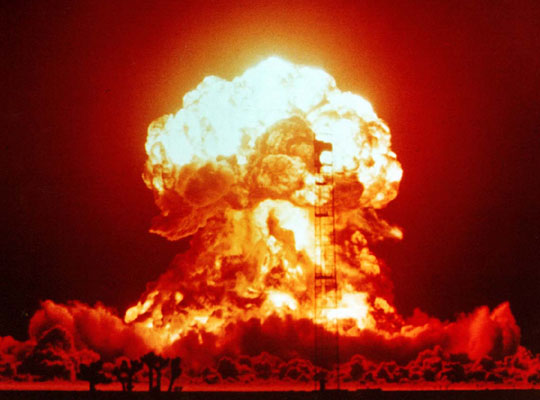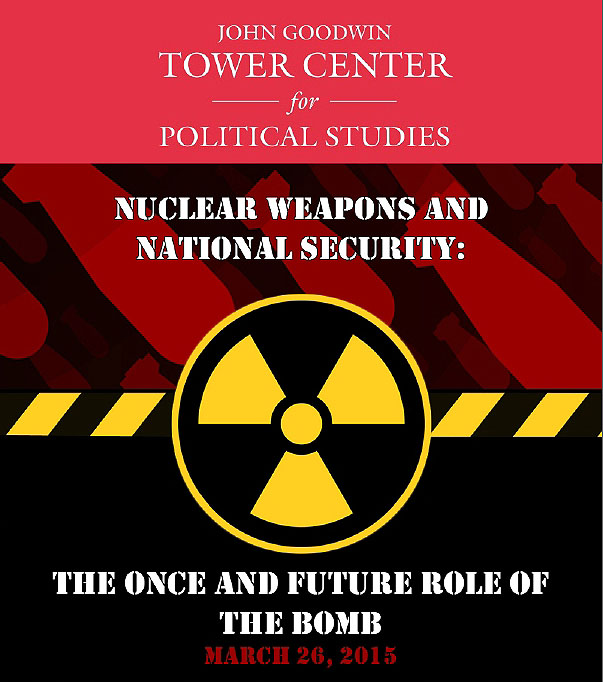SMU Tower Center program to examine the paradox of nuclear weapons, national security in ‘post-nuclear’ age
Tower Center to host a program March 26 that examines the continuing role of nuclear weapons.

DALLAS (SMU) – The United States is engaged in a massive effort to modernize its nuclear forces in spite of a 2009 pledge by President Barack Obama to “seek the peace and security of a world without nuclear weapons.”

Speakers will include the recently retired commander of U.S. Strategic Command and one of country’s leading historians of the nuclear age.
“Nuclear Weapons and National Security: The Once and Future Role of the Bomb” is scheduled for 5:30-7:30 p.m. in Elizabeth Perkins Prothro Hall on the SMU campus. Part of the Security and Strategy program at the Tower Center, the event is free and open to the public, but reservations are required. RSVP to tower@smu.edu and find directions at http://www.smu.edu/AboutSMU/Maps/.
“Nuclear weapons seem like a costly Cold War relic to disarmament advocates, and President Obama made a powerful plea for a world without them,” said Joshua Rovner, director of studies at the Tower Center and John G. Tower Distinguished Chair of International Politics and National Security. “Why, then, does Washington continue to invest in the arsenal? What is the strategic value of nuclear weapons today?”
Speakers include:
General C. Robert Kehler (USAF, ret.), Commander of U.S. Strategic Command until his retirement in December 2013. Kehler was directly responsible to the secretary of defense and the president for the plans and operations of all U.S. forces conducting global strategic deterrence, nuclear alert, global strike, space, cyberspace, and associated operations. He is currently the Lee Lecturer at the Center for International Security and Cooperation at Stanford University.
Francis J. Gavin, Frank Stanton Chair in Nuclear Security Policy studies & Professor of Political Science, MIT. Before joining MIT, he was the Tom Slick Professor of International Affairs and the Director of the Robert S. Strauss Center for International Security and Law at the University of Texas. His most recent book is Nuclear Statecraft: History and Strategy in America’s Atomic Age (Cornell University Press, 2012).
Paul C. Avey, postdoctoral fellow at the Tower Center for Political Studies will moderate. Before coming to SMU, he was a Stanton Nuclear Security fellow at MIT and a pre-doctoral fellow with the Managing the Atom project at Harvard. Avey is working on a book that examines why states without nuclear weapons confront nuclear-armed opponents. He is the author or coauthor of articles in International Security, Security Studies, International Studies Quarterly, and Foreign Policy.
The Security and Strategy Program at the Tower Center (SAS@SMU) serves to raise student and public awareness of national and international security affairs. Its principal mission is to prepare SMU undergraduates to become leaders in government service, academia, and industry. The program offers a rigorous set of courses on international relations, national security policy, strategy, American foreign policy, and the politics of military force. The Tower Center also gives students the opportunity to interact with policymakers, military officers, intelligence officials, and diplomats.
The United States has become increasingly active in regional conflicts since the end of the Cold War, and it invests enormous resources into projecting American power abroad. SAS@SMU encourages a vigorous debate on this investment. Along with the annual Tower Center National Security Conference, the Security and Strategy Program organizes regular forums and seminars that give the public the chance to converse with leading scholars about cutting edge research in security studies, as well as with government officials and defense industry executives.
The John Goodwin Tower Center for Political Studies commemorates the late US senator whose life was dedicated to public service and education and seeks to bridge the gap between the world of ideas, scholarship and teaching, and the practice of politics. The primary mission of the Tower Center is to promote the study of politics and international affairs and to stimulate an interest in ethical public service among undergraduates. An academic center where all parties and views are heard in a marketplace of ideas, the Tower Center pursues its mission in a nonpartisan manner.
###
21205-nr-03/12/15-kc